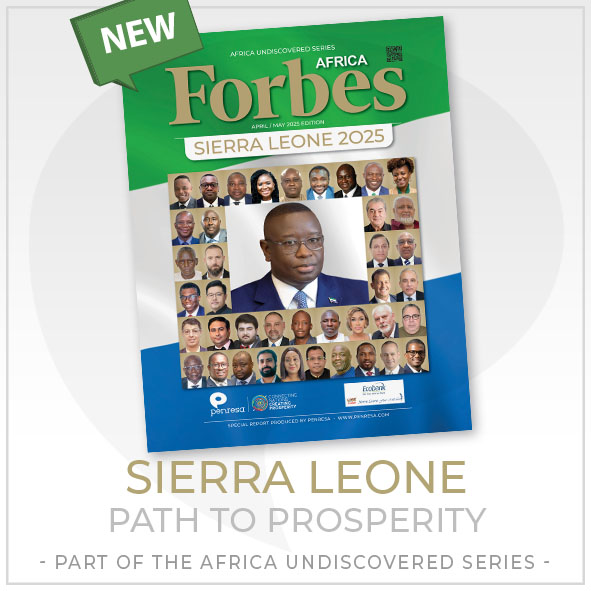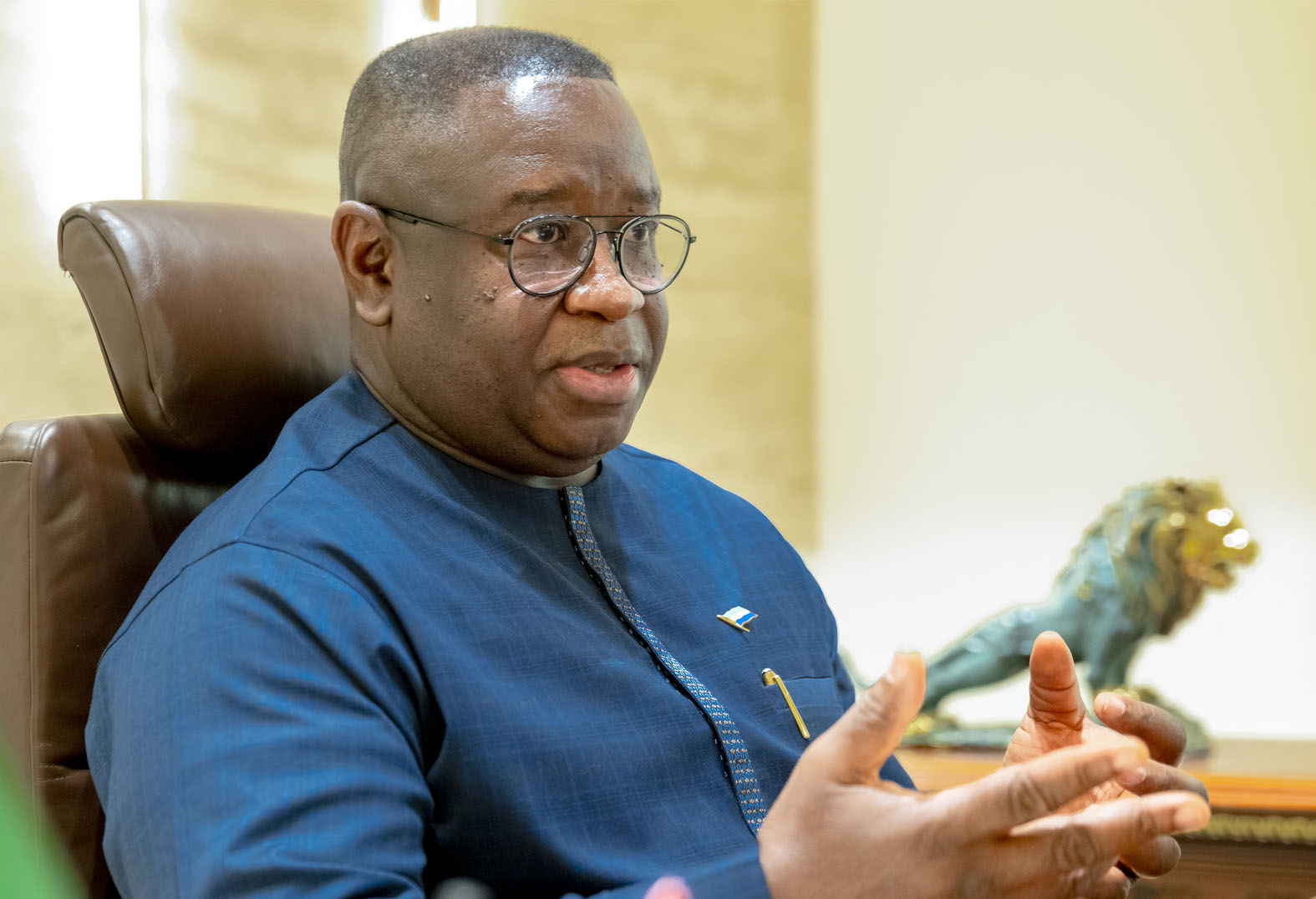Penresa had the immense honor to sit down with President Julius Maada Bio to discuss his administration’s achievements, tackling corruption, empowering women, and focusing on education, food security, and job creation for a sustainable future.
“We’re creating a business climate where investors thrive. With reduced corruption and infrastructure development, Sierra Leone is open for transformative, long-term partnerships.”
Your presidency began in 2018, and you started your second term in 2023. What would you consider your biggest and proudest achievement as president.
When I assumed office, I promised a “new direction” for Sierra Leone—a shift away from past inefficiencies to prioritize the country’s most critical resource: its people. Human capital development became our cornerstone because I believe education transforms lives. I was born in a small village over 200 miles from here. Education brought me to where I am today, leading a nation. However, in a country where three out of five adults were illiterate, many families couldn’t afford annual school fees as low as US$20. This was unacceptable and motivated us to act. We launched the free quality education initiative to ensure education was no longer a privilege but a universal right. It wasn’t easy. We inherited an economy in crisis with depleted resources, but through efficient resource allocation and anti-corruption measures, we implemented this program within four months of taking office. Today, six years later, the results are transformative. Millions of children, especially girls, now attend school. We’ve seen significant improvements in learning outcomes and increased interest in science and technology fields among young women. Through free education, we’ve not only empowered individuals but also strengthened entire families and communities. This initiative has gained international recognition, with the United Nations appointing me as co-chair for the Transform Education Summit. These efforts have also enhanced national pride and optimism for the future. Education isn’t just an investment in individuals; it is the bedrock for national and global competitiveness. Through education, we’re ensuring Sierra Leone is better positioned to contribute to and benefit from the global economy. For me, these achievements in education represent hope—equipping our citizens to navigate a complex world while laying the foundation for Sierra Leone’s role on the global stage. By making education accessible and of higher quality, we’re addressing poverty and inequality in tangible ways, ensuring that no child is left behind.
In 2024, you announced your medium-term national development plan. Can you provide an overview of its goals and expected outcomes by 2030?
Loading...
Our medium-term national development plan aligns closely with the UN Sustainable Development Goals and addresses core areas: human capital development, food security, public sector reform, and job creation. During my first term, we laid the groundwork with free quality education. In this term, we’ve prioritized food security—a lesson reinforced by vulnerabilities exposed during the Ukraine crisis, which caused global food inflation. Sierra Leone boasts over five million hectares of arable land, ample rainfall, and the potential to feed itself and export surplus. This is why we launched the “Feed Salone” initiative to promote climate-friendly agricultural practices. By 2030, we aim to create 500,000 jobs, transition to a middle-income economy by 2039, and establish a robust public sector capable of sustaining these efforts. This requires aligning our goals with global standards while addressing domestic challenges. Additionally, this plan focuses on reducing youth unemployment through skills development and vocational training. We’re also heavily investing in technology and infrastructure as enablers of our broader goals. From job creation to public sector reform, this plan is about resilience and empowerment. It ensures that as we address immediate challenges, we’re simultaneously building a foundation for sustainable growth. Our approach integrates education, health, and job creation into a holistic framework for human capital development. These elements complement each other and create a robust ecosystem that will continue driving our nation’s growth.
Why has food security become a flagship focus for your second term?
Food security is a vital pillar of human capital development. During the Ukraine crisis, Sierra Leone’s dependency on imports made us vulnerable to price shocks. This experience underscored the need for self-sufficiency. We realized we had the resources—fertile land and abundant rainfall—to feed ourselves sustainably. Agriculture is not only key to addressing malnutrition but also central to reducing poverty, as it employs over 60% of our population.
The “Feed Salone” initiative is our response. It’s more than an agricultural policy—it’s a strategy to diversify our economy, reduce dependency on imports, and create jobs. Climate-friendly farming methods, improved supply chains, and investments in agricultural infrastructure are core to this initiative. Furthermore, food security is tied to economic resilience. By growing our agricultural capacity, we’re ensuring that Sierra Leoneans can thrive during global crises and contributing to export opportunities that will strengthen our economy further. To thrive as a nation, we must feed our minds with education, nourish our bodies with secure food systems, and ensure our people are healthy. By taking these steps, we’re positioning Sierra Leone as a regional leader in sustainable agriculture and economic resilience. This holistic approach, rooted in our nation’s strengths, prepares us for challenges while unlocking new growth opportunities.
Gender equality has been a strong focus during your presidency. What opportunities does the Gender Equality and Women Empowerment Act provide for women?
Historically, women in Sierra Leone were marginalized in governance, education, and economic participation. With the Gender Equality and Women’s Empowerment Act, we’ve mandated that at least 30% of positions in governance and corporate leadership be held by women. In some sectors, we’ve exceeded this target. Education has been central to empowering women. Policies such as free quality education for girls and STEM scholarships have significantly increased female enrollment in traditionally male-dominated fields like engineering. For the first time in nearly two centuries, our universities see more girls applying for these programs. We’ve also prohibited child marriage and strengthened laws against gender-based violence. Initiatives like “Hands Off Our Girls,” led by the First Lady, have reduced teenage pregnancies by 30% in affected areas. Empowering women creates a ripple effect, enriching decision-making processes and accelerating national development. Through property rights reforms and access to micro-financing, women now play a more active role in Sierra Leone’s economy. Additionally, women now enjoy enhanced protections and opportunities to advance their careers, breaking down barriers that have historically held them back. The act and its accompanying initiatives also support women’s financial independence. By addressing gender inequality systemically, we’re paving the way for greater inclusion and creating a society where everyone can contribute meaningfully to national progress.
Can you elaborate on Sierra Leone’s diversification goals and how your administration supports public-private partnerships?
While mining has been Sierra Leone’s economic backbone, we’re shifting focus to diversify into manufacturing, agriculture, and infrastructure. For instance, we’ve made strides in light manufacturing, producing items like cooking oil and construction materials locally. This reduces import dependency while creating jobs. Public-private partnerships are vital to achieving these goals. Our National Investment Board simplifies bureaucracy and ensures that investors have government support. Additionally, through the Millennium Challenge Corporation, we’ve secured substantial funding—US$480 million for energy projects alone. We’ve also implemented reforms to tackle corruption, moving over 20 places up the global corruption index. These efforts assure investors that Sierra Leone is a stable and secure destination for long-term investments. Through diversification, we are building a more resilient economy that can support sustainable growth for generations. We’re making strides in sectors like renewable energy, infrastructure development, and agriculture processing, which also open opportunities for exports and partnerships.
What is your message to potential investors about Sierra Leone’s opportunities?
Sierra Leone is open for business. We’ve created a favorable investment climate through anti-corruption measures, policy incentives, and infrastructure improvements. For example, U.S. institutions have committed nearly US$1 billion to energy and airport projects, and we continue to attract interest from global partners like the U.K. and China. Our macroeconomic indicators are improving—inflation has dropped significantly, and we maintain fiscal discipline. Whether in agriculture, energy, or manufacturing, Sierra Leone offers untapped potential and a government ready to support investors every step of the way. If you’re looking for a stable, resource-rich, and growth-oriented destination, Sierra Leone is your answer.
For the full Penresa report on Sierra Leone CLICK HERE

Loading...
